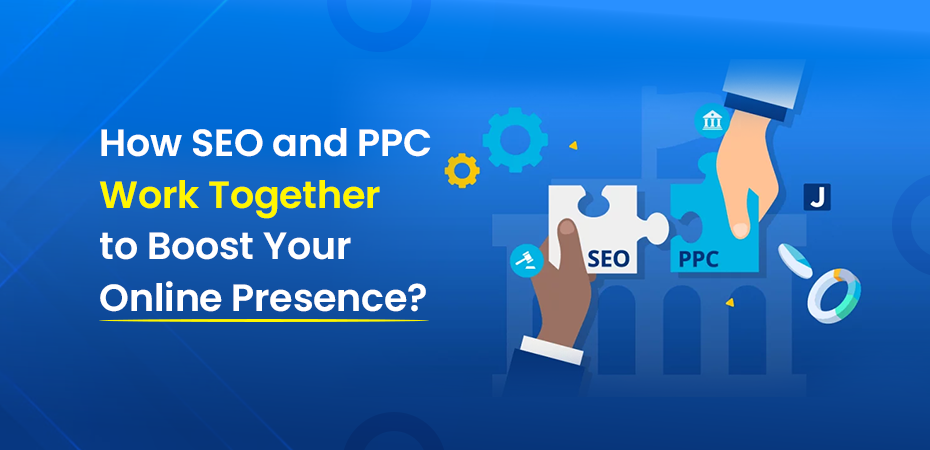How SEO and PPC Work Together to Boost Your Online Presence?



If you’ve ever wondered how to improve your website’s visibility in search engines, you’ve likely heard of two main strategies: SEO (Search Engine Optimization) and PPC (Pay-Per-Click advertising). These are both powerful tools for getting traffic to your website, but did you know that they work best when used together?
In this article, we’ll explore what SEO and PPC are, how PPC and SEO work together, and how combining them can boost your website’s performance, help you reach more customers, and increase your revenue. By the end, you’ll have a clear understanding of how SEO and PPC can be integrated for optimal results.
What is SEO?
SEO stands for Search Engine Optimization, and it’s the process of improving your website so that it ranks higher in search engine results for specific keywords. For example, if you own a website that sells camera bags, you want your site to appear when someone types “camera bags” into Google.
SEO helps your website appear in organic search results—these are the unpaid listings on search engines like Google. To improve SEO, you’ll need to focus on things like:
- Keyword Research: Finding the right keywords people use to search for your products or services.
- On-Page Optimization: Adjusting titles, meta descriptions, and content on your website to better align with the keywords.
- Content Creation: Writing high-quality, relevant content that answers users’ questions and provides value.
- Link Building: Getting other websites to link back to yours, which improves your credibility in the eyes of search engines.
- Technical SEO: Ensuring your website is fast, mobile-friendly, and easy for search engines to crawl and index.
The main benefit of SEO is that it can help you attract “free” traffic from search engines. Once your website ranks well, you can get consistent visitors without paying for ads. However, SEO can take time—sometimes months—before you start seeing results.
What is PPC?
PPC, or Pay-Per-Click advertising, is a method where you pay to have your ads displayed at the top of search engine results, on social media platforms, or other websites. The key thing with PPC is that you only pay when someone clicks on your ad.
You’ve probably seen PPC ads before—they are usually marked as “Sponsored” or “Ad” at the top of Google’s search results. Unlike SEO, where you work to rank organically over time, PPC can give you immediate visibility. Some common platforms for PPC ads include:
- Google Ads: Shows your ad at the top of Google search results.
- Bing Ads: Like Google Ads but on the Bing search engine.
- Social Media Ads: Platforms like Facebook, Instagram, and LinkedIn allow you to run PPC ads to reach specific audiences.
The beauty of PPC is that you have full control over how much you spend and who sees your ads. You can target people based on their location, age, interests, and even what time of day they’re online. However, the downside is that once you stop paying, your ads disappear, and so does your traffic.
Does SEO Affect PPC or Vice Versa?
One common question is whether PPC affects SEO or whether SEO affects PPC. The short answer is: no, they don’t directly impact each other. For instance, just because you run a lot of PPC ads doesn’t mean your website will automatically rank higher in organic searches. Similarly, ranking well in SEO won’t lower the cost of your PPC ads.
But, while they don’t directly influence each other, they can complement each other in powerful ways, helping you achieve better results than if you focused on just one of these strategies. Let’s take a look at how.
How SEO and PPC Can Work Together
1. Increased Search Engine Presence
When you use both SEO and PPC, you increase the chances of your brand appearing multiple times on the same search results page. For example, let’s say you sell hiking gear, and someone searches for “best hiking boots.” If you have a high organic ranking due to SEO efforts and a paid ad appearing at the top of the page, you dominate the search results. This makes your brand more visible, trustworthy, and more likely to get clicked on.
2. Recover Missed Clicks with PPC
Even if your website ranks #1 organically for a keyword, that doesn’t mean everyone will click on your organic listing. Studies have shown that PPC ads can help you capture clicks that might have gone to your competitors, even if you’re already ranking well in organic results. A study by Google revealed that pausing search ads can result in about 89% drop in clicks. That’s because many people click on paid ads first, even when organic results are visible.
By running PPC ads alongside SEO, you ensure that you’re recovering any clicks that might otherwise be missed.
3. Remarketing Opportunities
Remarketing is a PPC strategy that allows you to show ads to people who have previously visited your website. For instance, let’s say someone visits your site but doesn’t make a purchase. Later, while browsing another website or social media, they see an ad reminding them about your product. This can nudge them back to your site to complete the purchase.
By combining SEO (which brings in visitors) with PPC remarketing (which brings them back), you can increase the chances of turning those visitors into paying customers.
4. Testing Keywords with PPC for SEO
SEO requires a lot of time and effort to rank for certain keywords, and you don’t always know if a keyword will convert well until you rank for it. This is where PPC can be a great testing ground. You can use PPC to target a specific keyword and see how it performs. If it generates a lot of traffic and conversions, you might decide to focus your SEO efforts on that keyword as well.
Since PPC gives you immediate data, you can use it to test which keywords are worth pursuing organically.
5. Data Sharing for Smarter Decisions
Both SEO and PPC provide valuable data, and when you use both, you get double the insights. PPC gives you real-time data on which keywords drive traffic and convert visitors, while SEO shows you how users behave on your site over time. By combining this data, you can make smarter decisions about your overall PPC and SEO marketing strategy.
For example, if you notice a certain keyword performs well in PPC but has a high bounce rate (people leaving your site quickly), you might want to revise the landing page for that keyword. Similarly, SEO data can help you improve your PPC campaigns by highlighting which keywords bring in the most engaged users.
Advantages
Maximizing Brand Visibility and Credibility
One of the major advantages of using SEO and PPC together is the increased visibility and credibility it brings to your brand. When your website appears multiple times in the search results—both in paid ads and organic listings—it gives the impression that your brand is dominant in your industry. This makes users more likely to trust and click on your site.
This credibility is essential because consumers tend to trust organic results more than paid ads. By being visible in both, you’re building trust and authority, which can lead to more conversions over time.
Budget and Time Efficiency
Combining SEO and PPC is also more efficient in terms of both time and budget. SEO is a long-term strategy, meaning that it may take months to see results, but once your website ranks well, you can generate traffic for free. PPC, on the other hand, brings in traffic immediately, but you have to keep paying for it.
By using SEO and PPC strategies together, you can offset the weaknesses of each. PPC can bring you traffic while you’re waiting for your SEO efforts to kick in, and once your SEO is working, you can reduce your PPC budget, relying more on organic traffic.
Best Practices for Combining SEO and PPC
Here are some best practices to ensure that SEO and PPC work effectively together:
- Use Similar Keywords: By targeting the same keywords in both SEO and PPC, you create a more cohesive strategy. This ensures that you’re covering all your bases and not missing out on traffic for important search terms.
- Monitor Performance and Adjust: Continuously track the performance of both your SEO and PPC efforts. If certain keywords are driving conversions in PPC, consider focusing more on those keywords in your SEO strategy. If a keyword is underperforming in SEO, try boosting it with PPC ads.
- Leverage Remarketing: By combining both SEO and PPC marketing strategies you can use PPC remarketing to bring back visitors that your SEO efforts have brought to your site. Remarketing ads are a great way to nudge hesitant buyers toward making a purchase.
- Combine Data: Use the data from both pay per click and SEO to refine your strategy. PPC data can give you real-time insights into which keywords are driving traffic and conversions, while SEO analytics show you how your content is performing over time.
Working with an SEO and PPC Agency
For many businesses, managing both SEO and PPC campaigns in-house can be time-consuming and complicated. This is where partnering with a PPC and SEO agency can be incredibly beneficial. These agencies specialize in providing SEO and PPC services by creating, optimizing, and managing search engine marketing strategies, allowing you to focus on other aspects of your business.
Here are a few reasons why working with an SEO and PPC companies could be a smart move:
- Expertise: Agencies have experienced professionals who stay up-to-date with the latest trends and algorithm changes in both SEO and PPC, ensuring your campaigns are always optimized for the best results.
- Time-Saving: Managing SEO and PPC requires ongoing analysis, keyword research, content creation, and budget adjustments. Agencies handle these tasks for you, freeing up your time for core business activities.
- Access to Tools: Many agencies use advanced SEO and PPC tools that provide deeper insights and more detailed analytics than the average business might have access to.
- Customized Strategies: An agency will tailor strategies specifically to your business goals, ensuring that both SEO and PPC efforts are aligned and working together to maximize your return on investment (ROI).
By working with a reputable SEO and PPC agency, you can ensure that both strategies are expertly managed and optimized to deliver the best possible results for your website.
Conclusion
SEO and pay-per-click are often seen as separate strategies, but when used together, they can significantly amplify your online presence and marketing success. By combining the long-term benefits of SEO with the short-term advantages of PPC, you can create a more well-rounded strategy that drives traffic, improves brand visibility, and boosts conversions.
By following best practices like targeting similar keywords, testing campaigns, and leveraging data from both strategies, you’ll be able to make smarter decisions and improve the overall performance of your marketing efforts.
If you’re looking to enhance your online presence and maximize the benefits of SEO and PPC, Phoenix SEO Ninja offers expert services tailored to your business needs. Contact us today and hand us over the complete SEO and PPC management to help you achieve greater visibility, drive more traffic, and boost your ROI.